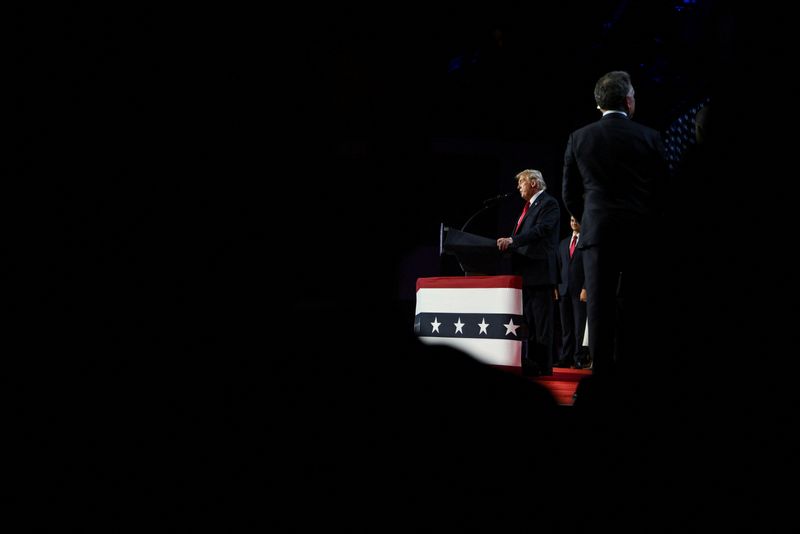US yields surge as Trump victory accelerates bond sell-off
By Harry Robertson and Gertrude Chavez-Dreyfuss
LONDON/NEW YORK (Reuters) -U.S. Treasuries fell sharply on Wednesday, sending yields surging to multi-month highs as Donald Trump's election victory stoked bets on economic policy shifts that could boost deficits and inflation.
Republican former President Trump swept back to power early in the U.S. morning, beating Democrat Vice President Kamala Harris in crucial swing states and capping a political comeback four years after he left the White House.
The benchmark 10-year Treasury yield rose as much as 18 basis points to 4.479%, its highest since July, as polls also showed Republicans winning control of the Senate and a close race for the House of Representatives.
The yield, which moves inversely to the price, was last up 16.4 bps at 4.449%, on track for its biggest one-day rise since April.
Trump campaigned on a platform of tax cuts, which economists say would juice the economy, widen budget deficits and increase government borrowing. He also touted tariffs, which analysts expect to stoke inflation and reduce the Federal Reserve's scope to cut interest rates.
"These election results will be really bad for fixed income and can unwind a lot of the bullishness in (the market). Trump keeps openly telling people that he will increase tariffs not just on China but with every trade partner," said Andrzej Skiba, head of BlueBay U.S. fixed income at RBC Global Asset Management.
"We're talking 10% tariffs across all global partners. This is a big deal because this could add 1% to inflation and if you add 1% to next year's inflation numbers, we should say bye to rate cuts."
The yield on the 30-year Treasury note last traded 19 bps higher at 4.641%. That was its highest since late May and set for its biggest one-day rise since March 2020, underscoring concerns about future borrowing.
The MOVE index, the benchmark gauge of rate volatility, hit a more than one-year high of 136.25 on Monday (NASDAQ:MNDY ), suggesting that Treasury yields across most maturities will move at least 8.5 basis points per day in either direction over the next month. It was at 130.43 on late Tuesday.
Harley Bassman, creator of the MOVE index and managing partner at Simplify Asset Management, predicted that based on his calculations, option prices anticipate an outsized move of 18 basis points in Treasury yields a day or two after the election. That has been the size of the move so far on Wednesday.
Trump clinched victory at around 5.30 a.m. ET after capturing the battleground states of Wisconsin, Pennsylvania, North Carolina and Georgia, according to Edison Research.
Treasury yields surged once it became clear Trump had considerably improved on his 2020 election performance against Joe Biden.
On the short end of the curve, the two-year yield peaked at 4.312%, its highest since late July, and last traded roughly 7.5 bps higher at 4.278%. It was on pace for its biggest one-day gain in a month.
The U.S. yield curve steepened sharply on Wednesday, with the gap between two-year and 10-year yields hitting 19.5, the highest since late September. The curve was last at 16 bps, from 8.8 bps late Tuesday.
The curve has been on a steepening trend for the last few months, a scenario that occurs when the Fed is cutting interest rates.
How much of Trump's tax cut plan will make it through Congress depends on whether the Republicans achieve a clean sweep. Close House races could take days to call.
U.S. budget deficits and government debt levels were projected to surge under either candidate in the election, according to several estimates, although Harris was expected to add less debt than Trump.
The Fed, meanwhile, kicks off its two-day monetary policy meeting on Wednesday and is expected to deliver another 25-bp rate cut, though future decisions look less certain.
Traders have reacted to the election results by trimming bets on Fed cuts next year, with rates seen staying above 4% until May 2025. The market has priced in about 42 bps of cuts this year and another 62 bps of reductions in 2025. Next (LON:NXT ) year's estimate came down from about 90 bps a few weeks ago.
"I start to worry when yields cross the 4.50% mark," said Matt Orton, chief market strategist at Raymond (NS:RYMD ) James Investment Management.
"If we don't reverse that upward trend, I would be more reticent to add too much more risk until we hear from the Fed or get a little bit more guidance with respect to where terminal rates might lie."
Source: Investing.com
